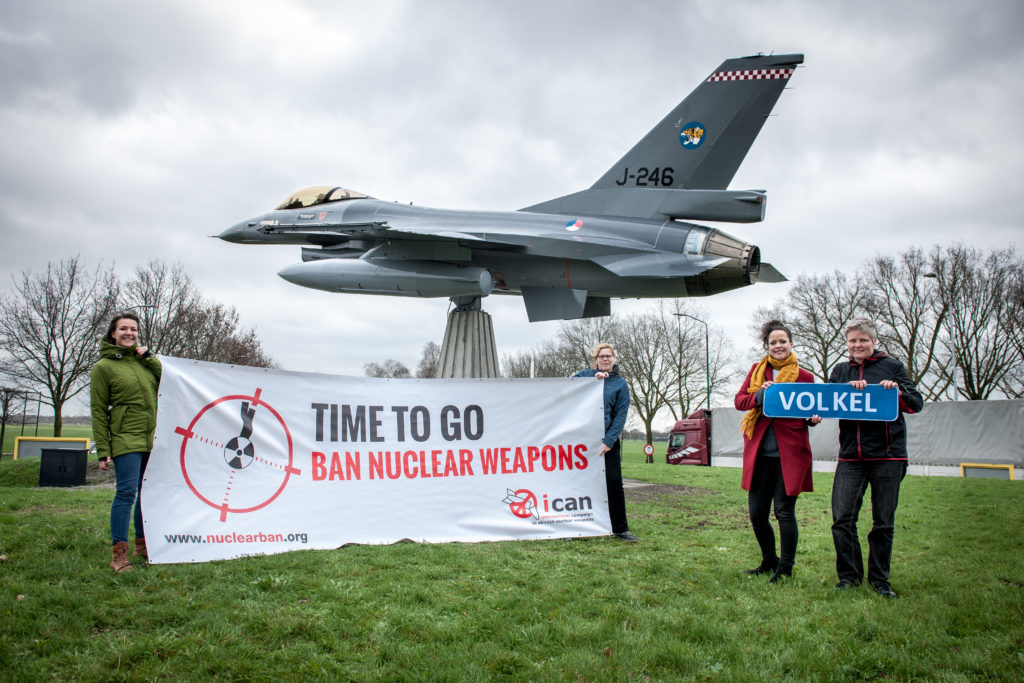The Dutch government published its response to a report by the Advisory Council on International Affairs (AIV) (31 January 2019), called “Nuclear weapons in a new geopolitical reality.” In the response, the government suggested that when the F-16 is definitely replaced by the F-35 it could be possible to end the nuclear task. The government points out that ending the nuclear task (currently an assignment of a squadron of fighter pilots, allegedly hosting about 20 nuclear bombs, and the related guns, gates and guards to keep them isolated), would not require changes in NATO membership, but would need to be well prepared.
The government also suggested that “in view of the increasing tensions and imminent arms race, identify opportunities together with allies to achieve the withdrawal of all Russian and American sub-strategic nuclear weapons from all over Europe – from the Atlantic to the Urals.”. Of course, the Dutch government is not eager to act unilaterally, and any withdrawal of the US nuclear weapons would require bilateral negotiations between the US and the Netherlands, and, as with previous withdrawals of forward deployed weapons, an appropriate sharing of information with NATO allies. The government went on to suggest that the “moment of modernization of the nuclear weapons located in Europe would be a logical starting point to take steps in that direction”.
By providing a timeline for ending the nuclear task, the government has its work cut out for it. According to Lockheed Martin, 8 of the 37 planes ordered will be in hand this year, and as production challenges are better worked out, the rest should arrive before the end of 2023. In addition, the B61 bombs currently stored in the Netherlands are meant to be replaced by 2024, so this timeline provides a chance for the government to send those bombs back to the US one – way.
On 7 February 2019, the chamber held discussions about the NATO defence ministerial in the context of the Dutch national plan to structurally invest in priority capacities that fit NATO collective objectives. Nuclear weapon capabilities are NOT a priority capacity building objective and should not be misconstrued as such. Several NATO members have national policies and legislation that prevents things like nuclear sharing, or nuclear armed ships docking at their ports. Some have argued that changing basing arrangements must be made in full consultation with all allies, but historically (e.g. in Greece, Canada and the UK) basing decisions have been made bilaterally and then communicated afterwards to the alliance. Belgium, Germany, Italy, the Netherlands and Turkey all have the opportunity and obligation to protect their citizens by engaging in bilateral discussion with the US to remove forward deployed nuclear weapons from their territories.
Activities needed to meet this deadline are likely to also support efforts to fulfil the 2010 nuclear Non Proliferation Treaty agreement to reduce the role of nuclear weapons in security strategies. As it will be necessary for the Netherlands to with allies to reduce the role of nuclear weapons in NATO security strategies and doctrines. As long as nuclear weapons are considered necessary for security, efforts to eliminate them will fail. Previous coalitions worked diligently with allies to re-frame the discussion on burden sharing, to readjust the alliance towards security threats and the arsenals needed to defend against them.
The Dutch government has given itself a timetable that elected officials can hold them accountable to. As the US weapons will need to leave European territory in order to be refitted with the new guided tail kit, among other new capabilities, there is no reason to bring them back. The government can, working with the US, use the plans already designed to safely remove the weapons to the US, and then invite external officials (from IAEA or other governments) to inspect the bunkers in which they were formerly stored, verifying their removal. Overall, this is a confidence building measure and risk reduction effort as well as a demonstration of effective transparency in nuclear weapons matters.
A focus on defence of critical infrastructure, security of energy supply and attention to the low-cost high reward information warfare currently undermining democracies across the alliance would strengthen security without risking the mass murder of civilians. Agreeing to participate in a new nuclear arms race by rationalising the claim that new nuclear weapons are needed to counter the development of new weapons by others is a false equivalency that increases global risks of nuclear use even to the point of nuclear war.

